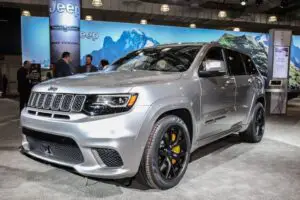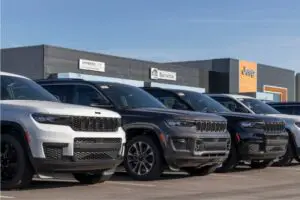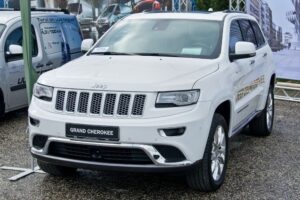The Jeep Grand Cherokee is one of the most popular SUVs on the market, and it’s easy to see why. It’s built with a luxurious interior and an exterior that can withstand any terrain.
It’s got plenty of power and several safety features that make it great for anyone who loves to go off-roading or take their family on an adventure.
There have often been complaints about this SUV not starting. People immediately think it is a manufacturing defect, but in reality, this is a common occurrence.
So, the answer to the question, “Why won’t my Jeep Grand Cherokee start?” can be divided into several parts.
Let’s take a look at them:
- Failing Battery
- Corrosion On The Battery Terminals
- Faulty Spark Plugs
- Issues With The Starter Relay
- Issues With The Ignition Coil Pack
- Faulty Starter Solenoid
- Dirty Fuel Lines Or Fuel Filter
- Malfunctioning Fuel Pump
- Faulty Fuel Injectors
- Malfunctioning Oxygen Sensor
Above are ten possible causes for your Jeep Grand Cherokee not starting. Continue reading to find out more about them.
Table of Contents
- 1 What Would Cause A Jeep Grand Cherokee To Not Start?
- 1.1 1: Failing Battery
- 1.2 2: Corrosion On The Battery Terminals
- 1.3 3: Faulty Spark Plugs
- 1.4 4: Issues With The Starter Relay
- 1.5 5: Issues With The Ignition Coil Pack
- 1.6 6: Faulty Starter Solenoid
- 1.7 7: Dirty Fuel Lines Or Fuel Filter
- 1.8 8: Malfunctioning Fuel Pump
- 1.9 9: Faulty Fuel Injectors
- 1.10 10: Malfunctioning Oxygen Sensor
- 2 Frequently Asked Questions
- 2.1 Q1. Why Won’t My Jeep Grand Cherokee Start With New Battery?
- 2.2 Q2. Why Won’t My Jeep Grand Cherokee Start Even With A Jump?
- 2.3 Q3. Why Won’t My Jeep Grand Cherokee Start But Lights Work?
- 2.4 Q4. Why Won’t My Jeep Grand Cherokee Start But Cranks?
- 2.5 Q5. Why Won’t My Jeep Grand Cherokee Start Just Clicks?
- 2.6 Q6. Why Won’t My Jeep Grand Cherokee Start In The Cold Weather?
- 2.7 Q7. Why Won’t My Jeep Grand Cherokee Start After I Get Gas?
- 2.8 Q8. Why Won’t My Jeep Grand Cherokee Start But Radio Works?
- 3 Conclusion
What Would Cause A Jeep Grand Cherokee To Not Start?
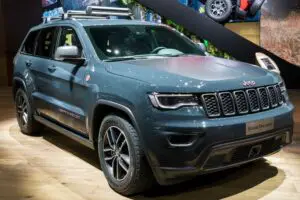
There can be a lot of factors that can affect the starting capability of your Jeep Grand Cherokee.
They have been listed above, and this section of the article will be discussing all of them, so you can know better.
1: Failing Battery
This is the most common reason your Jeep Grand Cherokee won’t start.
The battery is the main power source for your vehicle, and if it’s not fully charged or has failed, you won’t be able to turn over your engine and get going.
Fortunately, there are some easy ways to tell if your battery is the problem and even easier ways to fix it.
What Should You Do About It?
These are some tips for when you figure out that it is indeed the battery that is faulty.
- If you’ve got a multimeter (or if you know someone who does), check the voltage on both terminals. If it’s less than 12 volts, your battery is dead and needs replacement.
- Next, check the connections between the battery terminals and the rest of the electrical system. If they are loose, tighten them up.
- Now try to start your Jeep. It will hopefully start, and you can be on your merry way.
2: Corrosion On The Battery Terminals
If there is corrosion on the terminals of your Jeep Grand Cherokee’s battery, it may be preventing it from receiving enough power to turn over and start.
You can find yourself in a frustrating situation if this happens to you. Fortunately, there are some solutions available.
What Should You Do About It?
- Using a wire brush, you can clean off corrosion on your Jeep Grand Cherokee’s battery terminals.
- You should also check your cables for signs of wear or damage. If you notice any issues (such as fraying), you should replace them immediately before they cause further problems down the road.
3: Faulty Spark Plugs
The spark plugs are responsible for creating the spark that ignites the fuel in your Jeep Grand Cherokee’s engine.
A faulty spark plug can cause several problems, including a weak or non-existent spark, which can lead to a lack of power and difficulty starting, as well as misfires and poor fuel economy.
What Should You Do About It?
- Check your owner’s manual to find out how often you should replace your spark plugs and which type to buy (there are several different kinds).
- If you’ve got a faulty spark plug and want to replace it yourself, remove it carefully with a socket wrench or ratchet set and replace it with an identical new part (make sure you get the right size).
4: Issues With The Starter Relay
If your Jeep Grand Cherokee won’t start, the first thing you should check is the starter relay. This relay is located near the battery and controls the electrical flow to your starter motor.
If this part is not working correctly, it may cause your Jeep to fail to start.
What Should You Do About It?
- The easiest way to troubleshoot an issue with your Jeep’s starter relay is to test it with a multimeter or voltmeter.
- You can do this by using one lead on each terminal of the relay – one red and one black – and checking for voltage at each terminal when you turn on your key.
- If no voltage is present when you turn on your key, then this part may be an issue.
5: Issues With The Ignition Coil Pack
The ignition coil pack is crucial to your Jeep Grand Cherokee’s electrical system. It’s responsible for firing the spark plugs when you turn the key, which starts your vehicle.
As such an issue with this part of the system can cause problems when trying to start your vehicle.
What Should You Do About It?
- Ensure all wires and connections are secure and in good condition before making any repairs or replacements to save yourself some time and effort later on down the road.
- If necessary, replace any damaged wires or connectors before proceeding further and replacing the ignition coil pack.
6: Faulty Starter Solenoid
A faulty starter solenoid can cause your Jeep Grand Cherokee to not start.
If you have an older model, it might be worth checking out the starter solenoid to see if it is faulty. Continue reading to find out how to check one.
What Should You Do About It?
- If your Jeep Grand Cherokee won’t start due to a faulty starter solenoid, you will need to replace it with a new one.
- However, if you have an older model, buying an aftermarket part might be cheaper than getting OEM parts for your vehicle.
- You can also test the existing one by using an ohm meter. You will likely have a faulty starter solenoid if the reading is not zero.
7: Dirty Fuel Lines Or Fuel Filter
If you’re having trouble starting your Jeep Grand Cherokee, it may be because of a dirty fuel filter or fuel lines.
The fuel filter is designed to remove dirt from the gas as it passes through, so if it gets clogged up by debris or other contaminants, your engine won’t get the fuel it needs to start.
What Should You Do About It?
- Use a fuel line cleaner to clean out any sediment or rust in your fuel lines or filter. You can find these at most auto parts stores.
- It’s important to check your fuel lines and filter beforehand—sometimes they’re damaged separately.
8: Malfunctioning Fuel Pump
If your Jeep Grand Cherokee doesn’t start, it could be because of a malfunctioning fuel pump.
The fuel pump is what pushes gas from the tank to the engine. If it’s not working correctly, your vehicle won’t be able to start up.
What Should You Do About It?
- The first step in troubleshooting a faulty fuel pump is checking the fuses and ensuring they’re not blown. If this checks out, the next step is to check that all electrical connections are clean and tight.
- If none of these steps work, you may need to replace your fuel pump entirely.
9: Faulty Fuel Injectors
The fuel injectors are responsible for injecting the right fuel into your Jeep Grand Cherokee’s engine. If they’re not working properly, your Jeep won’t start.
What Should You Do About It?
- If you suspect that your fuel injectors are faulty, you should have them checked out by a professional.
- If the problem lies with your Jeep’s fuel injectors, they need to be replaced to get your SUV on the road again.
10: Malfunctioning Oxygen Sensor
The oxygen sensor is the part of your Jeep Grand Cherokee that measures the amount of oxygen in your exhaust and sends this information to the engine control unit.
This information is used to regulate fuel flow and ignition timing. Its malfunction can stop the vehicle from starting.
A malfunctioning oxygen sensor will also cause other problems, including no power or poor performance, rough idling/stalling, poor fuel economy, and sluggish acceleration/deceleration.
What Should You Do About It?
- The best way to fix a malfunctioning oxygen sensor is to replace it with a new one. This will ensure that your Jeep Grand Cherokee starts and runs smoothly again.
- Repairing these things is not an option, so you should get them replaced.
Frequently Asked Questions
Q1. Why Won’t My Jeep Grand Cherokee Start With New Battery?
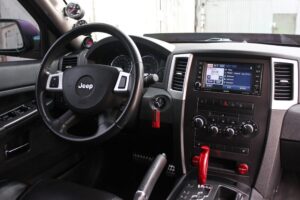
The first thing you should check is whether or not the cables are properly connected to the battery terminals.
Also, ensure that if you’ve had any work done on your Jeep recently (like replacing the alternator), all of those connections are solid.
If that doesn’t solve your problem, then there may be a problem with either your starter or alternator. You should take your SUV to a professional for a proper diagnosis.
Q2. Why Won’t My Jeep Grand Cherokee Start Even With A Jump?
There are not many things that could be causing your Jeep Grand Cherokee to not start, even after a jump. The new battery may simply not be charged enough.
You should use a compatible charger and attach it. The battery can take up to 24 hours to fully charge, so try starting your SUV again in a couple of hours.
Q3. Why Won’t My Jeep Grand Cherokee Start But Lights Work?
If the lights turn on, it rules out the battery as a source of the issue. It also has sufficient charge to turn the lights on, so the battery level is not a problem here.
So, this leaves behind the alternator or the starter. It could also be related to the fuel system, but that is not too likely.
Q4. Why Won’t My Jeep Grand Cherokee Start But Cranks?
The first reason is that your fuel pump has failed and needs to be replaced. You can either replace it yourself or take it to a mechanic who can do it for you.
The fuel filter could also be the culprit here. It gets dirty over time, and there is a chance it is not letting fuel into the engine for combustion.
Q5. Why Won’t My Jeep Grand Cherokee Start Just Clicks?
A clicking noise is usually due to the starter. So, if your Jeep Grand Cherokee emits a clicking sound when putting it into the ignition, it is a symptom of a failed starter.
The vehicle cannot be jump-started either. It may be at fault here, and the only thing that can be done is to replace it with a new one.
Q6. Why Won’t My Jeep Grand Cherokee Start In The Cold Weather?
First and foremost, make sure your battery is charged. Your battery should be able to provide enough electricity for the engine to start up even in cold temperatures.
If your battery dies, it will not have enough power to turn over the starter motor and get the vehicle started.
If you live in an exceptionally cold area, you should ensure the battery has been designed to work at those temperatures.
You should use a battery that has more cranking amperes. The higher the amperage, the better performance in extreme temperature environments.
Q7. Why Won’t My Jeep Grand Cherokee Start After I Get Gas?
There is almost a certain chance that the fuel filter is clogged to the point that it is not letting any fuel into the engine.
If you are at a gas station, there may be new filters available. Changing the filter will get your SUV up and running again.
If not, then you can only take out the existing filter and clean it as much as possible.
Q8. Why Won’t My Jeep Grand Cherokee Start But Radio Works?
It could be that a fuse blew, which is preventing you from starting your Jeep. Another reason can be a fault in the starter or the alternator.
If you don’t know what you are looking for, you should get the help of an expert who will diagnose the source of the problem for you.
Related: What Are The Worst Years For The Jeep Grand Cherokee?
Conclusion
Now that you’ve read this article, you should have a much better idea of why your Jeep Grand Cherokee won’t start and what to do about it.
All you need to do is keep an eye out for symptoms and narrow them down until you can figure out the source of the problem.
Hopefully, this guide has been helpful in helping you to troubleshoot your Jeep Grand Cherokee’s starting issues.

I am Tahir Azam, and I have been writing amazing articles for TaxiHack for as long as I can remember. I know everything that is to know when it comes to automobiles and is always on top of industry news and developments. While I am not an expert by any means, I pride myself on knowing the ins and outs of many different problems and, of course, their solutions. The articles on our website are some of the best and well-researched content that you will find, and I spend countless hours making sure this remains to be true. This is why I ask you to take your time out and read some of my articles, especially if you find a topic that resonates with you or is something you are looking into. This way, you will find the perfect mix of information and tips on your desired topic. Learn more about Tahir.

